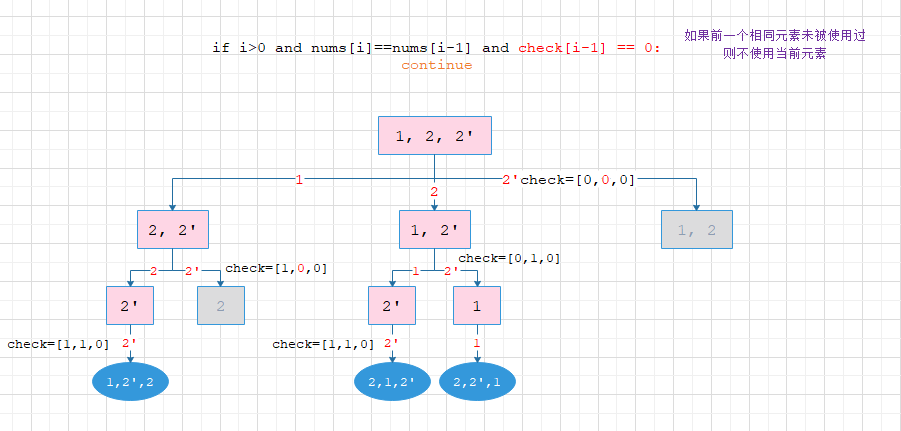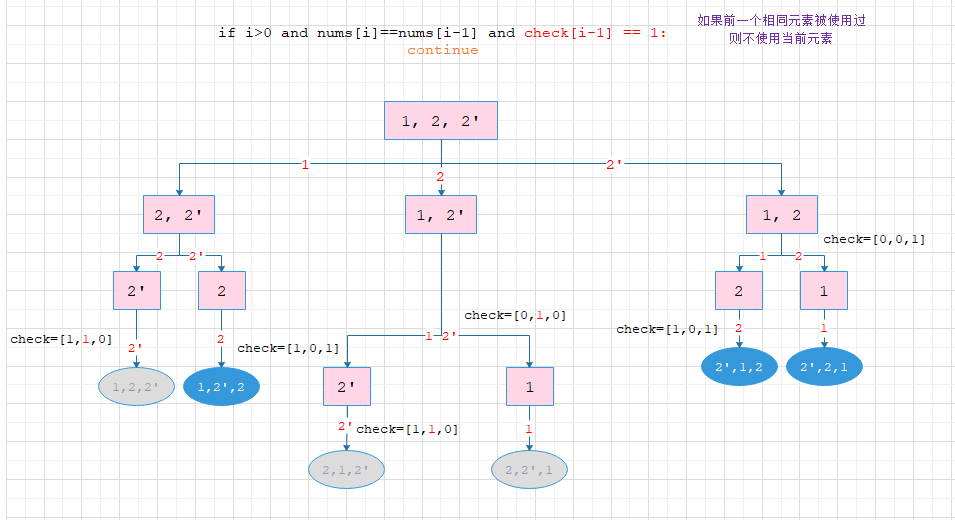47. Permutations II (全排列有重复的元素)
Given a collection of numbers that might contain duplicates, return all possible unique permutations.
For example,[1,1,2] have the following unique permutations:
[ [1,1,2], [1,2,1], [2,1,1]
1. if i > 0 and nums[i] == nums[i-1] and check[i-1] == 0
灰色为剪枝部分,蓝色为答案部分:

2. if i > 0 and nums[i] == nums[i-1] and check[i-1] == 1
灰色为剪枝部分,蓝色为答案部分:

能够明显发现第一种能够提前剪枝,减少计算步骤和搜索次数,并且第一种选择了重复元素的第一个,而第二种选择了重复元素的最后一个,虽然答案都相同,我们成年人当然是要选效率更高一些的那一种对吧~
class Solution: def __init__(self): self.res = [] def permuteUnique(self, nums: List[int]) -> List[List[int]]: def dfs(path,nums,level,used): if len(path) > len(nums): return if len(path) == len(nums): self.res.append(path.copy()) for i in range(0,len(nums)): if i >=1 and nums[i] == nums[i-1] and used[i-1]: continue if used[i]: continue path.append(nums[i]) used[i] = True dfs(path,nums,i,used) path.pop() used[i] = False used = [False] * len(nums) used_list = [] nums = sorted(nums) dfs([],nums,0,used) return self.res
与上一题不同,就是在19行加个判断即可。
1 class Solution(object): 2 def __init__(self): 3 self.res = [] 4 5 def permuteUnique(self, nums): 6 """ 7 :type nums: List[int] 8 :rtype: List[List[int]] 9 """ 10 self.help(nums, 0, len(nums)) 11 12 return self.res 13 14 def help(self, a, lo, hi): 15 if(lo == hi): 16 self.res.append(a[0:hi]) 17 for i in range(lo, hi): 18 #判断 i 是否已经在当过头元素了 19 if a[i] not in a[lo:i]: 20 self.swap(a, i, lo) 21 self.help(a, lo + 1, hi) 22 self.swap(a, i, lo) 23 def swap(self, a, i, j): 24 temp = a[i] 25 a[i] = a[j] 26 a[j] = temp





